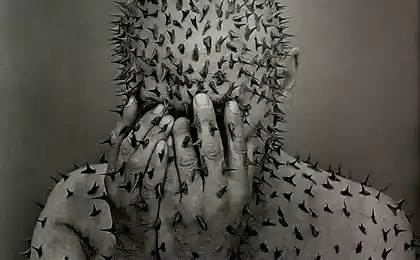461
Brené brown: 4 "truths" that make us unhappy
We're good enough, and it's trueWe are all very different, but we want the same thing. Shake our lives, which could be better. To be happier, to love more, to be able to forgive and be in healthy relationships with others. To do this, we do our best!
Brené Brown the author of the book the Gifts of imperfection and TED speaker, for 12 years studying what prevents us from living. Despite all efforts, does not allow us to conduct an open and real life that everyone is talking about? It turns out that many of the assumptions that we believe to be the truth, and that we think will help to solve all our problems, in fact is completely wrong.
1. Fit does NOT mean to be in placeWe use some words and not quite sure of their meaning, and sometimes use them quite wrong. This makes it difficult to understand what is really happening around them.
Thirteen million seven hundred ninety one thousand four hundred ninety three
So, to be in place does not mean "fit". Attempts to inscribe itself in some kind of framework — this is the most serious obstacle to be in place.
You fit in when you assess the situation and the people, and then turn himself into a RAM's horn to match them — and people and situations. To be in place is quite another. It is to be who you really are, let others see and know you. To be is to admit that you like to paint pumpkins and I hate to speak in public.
Many of us suffer from this difference between who we really are and what we are trying to appear to be thought of. I, for example, an expert on the writing itself, in some kind of framework. I asked the people we often call "other": scientists, artists, thinkers — they usually don't fit in anything. If you look closely at them and their works, will find that everything is permeated with acceptance of themselves. Someone went long on this as most, and someone that was from childhood.
One of my companions, neuropathic, said: "My parents felt that I wasn't playing on the football team. They didn't care that I'm weird and unsociable. My friends at school began to translate books on the Klingon language, and the parents said, "Wow, how cool!"you took me with you to the event dedicated to the television series Star Trek!»
Parents taught him to be. And if we do not receive such support from their parents, have to cultivate that feeling in the age of reason.Otherwise we will feel like at the school disco: all the fun, and you do tapestry.
The feeling of "I am" begins with acceptance.
If you believe that you are good enough, it gives the courage to be unique, vulnerable and imperfect. How do you accept yourself, so you can be on the spot. If faith in ourselves no, we behave like chameleons, trying to be good enough.Although we already good enough and it's true.
2. Wine is NOT badI will say this, I have to feel guilty. Wine is great because it helps us to stay the course. It appears when we compare their actions or non-action with their internal values. Sometimes feel after this comparison is not very good, and it forces us to change and to reflect.
I talk to people of different faiths, and many say: "As a Catholic, I'm to blame" or "As a Jew, I'm to blame". And when I ask to explain, they say something like, "If I don't come to Shabbat every Friday, I'm a bad son. My brother goes".
Strictly speaking, this is not a fault. It's a shame, and shame the worst is that we often don't know exactly when we feel shame. Those whom I questioned, saying: "I'm a useless person, a piece of shit. I don't blame parents because they don't love me who will love me like this?"It's a shame. We may not always pick up his name. But we know what it's like to feel this shame. And it's a different emotion than wine.
To see the difference, think about what you say, if you made a mistake. If it is "I made a mistake", then you feel guilty. But if you say "I'm Sorry. I am one big mistake" is shame. When you understand the difference between guilt, shame, and guilt can be used to your benefit. It indicates the difference between what we did and who we really are. It is already possible to think and change their behavior.
3. Perfectionism is NOT the pursuit of the idealIt sounds awful even to me, but I will say this. Perfectionism is NOT the achievements and growth. Perfectionism is the belief that if we live the perfect life, perfect look and perfect act, we will avoid accusations, condemnation, and shame.
Eighty two million four hundred twenty four thousand nine hundred twenty five
Many perfectionists, including me, in my childhood I was praised for my achievements, good grades, politeness and neat appearance. Then we learned this threat system: I am what I achieve, I'm good as well I can. Since then, we have in mind all the time running line: to Meet expectations. Reach. To do to perfection.
A healthy desire for the best focus on you. It appears when you ask: "How and where can I improve myself?"The perfectionist focus on others: "what will they think?"
Studies show that perfectionism hinders success and often leads to depression, irritability and addictions. Perfectionists often miss opportunities that they are simply afraid to show the world something that isn't perfect and may disappoint others.
The perfectionist like a knight with a shield weighing one hundred pounds: the shield are supposed to protect, but in reality does not even join the battle.
Here's another example: in the song Leonard Cohen Anthem has these words: "there is a crack. They are the light."
4. To be vulnerable takes courageThere are several myths about the vulnerabilities that not allow us to be sincere, to receive and to give love.
The first myth: vulnerability is weakness.
The second vulnerability can be avoided.
First, vulnerability is not weakness. This is perhaps the most accurate measure of our courage. I ask participants in my research about situations where they feel vulnerable. "When you take responsibility for something at work, something went wrong", "I know a man in love," "When I call a friend and say that his son just died", "When I send daughter to school and I know that it will be difficult, but it should handle", "When I meet with a nurse from hospice that will take care of my mother."
Someone says never feels vulnerable. But in fact, it happens to all of us, it's painful and scary feeling that we feel naked and nowhere to go. But we cope in different ways. You can step back, push vulnerability away, to turn into rage or perfectionism — do I personally. The fact that we all somehow transform it.
To transform vulnerability into courage, you need to learn to recognize this feeling and just be in the here and now, with this uncertainty and risk.
When you know what you're feeling and why, you can stop, breathe, pray, ask for help, and to make a choice that reflects you and what you believe. published
©Brené brown, the translation of Nadja Borisova
P. S. And remember, just changing your mind — together we change the world! ©
Source: //www.refreshschool.com/single-post/2016/11/17/4-istini-1
Brené Brown the author of the book the Gifts of imperfection and TED speaker, for 12 years studying what prevents us from living. Despite all efforts, does not allow us to conduct an open and real life that everyone is talking about? It turns out that many of the assumptions that we believe to be the truth, and that we think will help to solve all our problems, in fact is completely wrong.
1. Fit does NOT mean to be in placeWe use some words and not quite sure of their meaning, and sometimes use them quite wrong. This makes it difficult to understand what is really happening around them.
Thirteen million seven hundred ninety one thousand four hundred ninety three
So, to be in place does not mean "fit". Attempts to inscribe itself in some kind of framework — this is the most serious obstacle to be in place.
You fit in when you assess the situation and the people, and then turn himself into a RAM's horn to match them — and people and situations. To be in place is quite another. It is to be who you really are, let others see and know you. To be is to admit that you like to paint pumpkins and I hate to speak in public.
Many of us suffer from this difference between who we really are and what we are trying to appear to be thought of. I, for example, an expert on the writing itself, in some kind of framework. I asked the people we often call "other": scientists, artists, thinkers — they usually don't fit in anything. If you look closely at them and their works, will find that everything is permeated with acceptance of themselves. Someone went long on this as most, and someone that was from childhood.
One of my companions, neuropathic, said: "My parents felt that I wasn't playing on the football team. They didn't care that I'm weird and unsociable. My friends at school began to translate books on the Klingon language, and the parents said, "Wow, how cool!"you took me with you to the event dedicated to the television series Star Trek!»
Parents taught him to be. And if we do not receive such support from their parents, have to cultivate that feeling in the age of reason.Otherwise we will feel like at the school disco: all the fun, and you do tapestry.
The feeling of "I am" begins with acceptance.
If you believe that you are good enough, it gives the courage to be unique, vulnerable and imperfect. How do you accept yourself, so you can be on the spot. If faith in ourselves no, we behave like chameleons, trying to be good enough.Although we already good enough and it's true.
2. Wine is NOT badI will say this, I have to feel guilty. Wine is great because it helps us to stay the course. It appears when we compare their actions or non-action with their internal values. Sometimes feel after this comparison is not very good, and it forces us to change and to reflect.
I talk to people of different faiths, and many say: "As a Catholic, I'm to blame" or "As a Jew, I'm to blame". And when I ask to explain, they say something like, "If I don't come to Shabbat every Friday, I'm a bad son. My brother goes".
Strictly speaking, this is not a fault. It's a shame, and shame the worst is that we often don't know exactly when we feel shame. Those whom I questioned, saying: "I'm a useless person, a piece of shit. I don't blame parents because they don't love me who will love me like this?"It's a shame. We may not always pick up his name. But we know what it's like to feel this shame. And it's a different emotion than wine.
To see the difference, think about what you say, if you made a mistake. If it is "I made a mistake", then you feel guilty. But if you say "I'm Sorry. I am one big mistake" is shame. When you understand the difference between guilt, shame, and guilt can be used to your benefit. It indicates the difference between what we did and who we really are. It is already possible to think and change their behavior.
3. Perfectionism is NOT the pursuit of the idealIt sounds awful even to me, but I will say this. Perfectionism is NOT the achievements and growth. Perfectionism is the belief that if we live the perfect life, perfect look and perfect act, we will avoid accusations, condemnation, and shame.
Eighty two million four hundred twenty four thousand nine hundred twenty five
Many perfectionists, including me, in my childhood I was praised for my achievements, good grades, politeness and neat appearance. Then we learned this threat system: I am what I achieve, I'm good as well I can. Since then, we have in mind all the time running line: to Meet expectations. Reach. To do to perfection.
A healthy desire for the best focus on you. It appears when you ask: "How and where can I improve myself?"The perfectionist focus on others: "what will they think?"
Studies show that perfectionism hinders success and often leads to depression, irritability and addictions. Perfectionists often miss opportunities that they are simply afraid to show the world something that isn't perfect and may disappoint others.
The perfectionist like a knight with a shield weighing one hundred pounds: the shield are supposed to protect, but in reality does not even join the battle.
Here's another example: in the song Leonard Cohen Anthem has these words: "there is a crack. They are the light."
4. To be vulnerable takes courageThere are several myths about the vulnerabilities that not allow us to be sincere, to receive and to give love.
The first myth: vulnerability is weakness.
The second vulnerability can be avoided.
First, vulnerability is not weakness. This is perhaps the most accurate measure of our courage. I ask participants in my research about situations where they feel vulnerable. "When you take responsibility for something at work, something went wrong", "I know a man in love," "When I call a friend and say that his son just died", "When I send daughter to school and I know that it will be difficult, but it should handle", "When I meet with a nurse from hospice that will take care of my mother."
Someone says never feels vulnerable. But in fact, it happens to all of us, it's painful and scary feeling that we feel naked and nowhere to go. But we cope in different ways. You can step back, push vulnerability away, to turn into rage or perfectionism — do I personally. The fact that we all somehow transform it.
To transform vulnerability into courage, you need to learn to recognize this feeling and just be in the here and now, with this uncertainty and risk.
When you know what you're feeling and why, you can stop, breathe, pray, ask for help, and to make a choice that reflects you and what you believe. published
©Brené brown, the translation of Nadja Borisova
P. S. And remember, just changing your mind — together we change the world! ©
Source: //www.refreshschool.com/single-post/2016/11/17/4-istini-1























